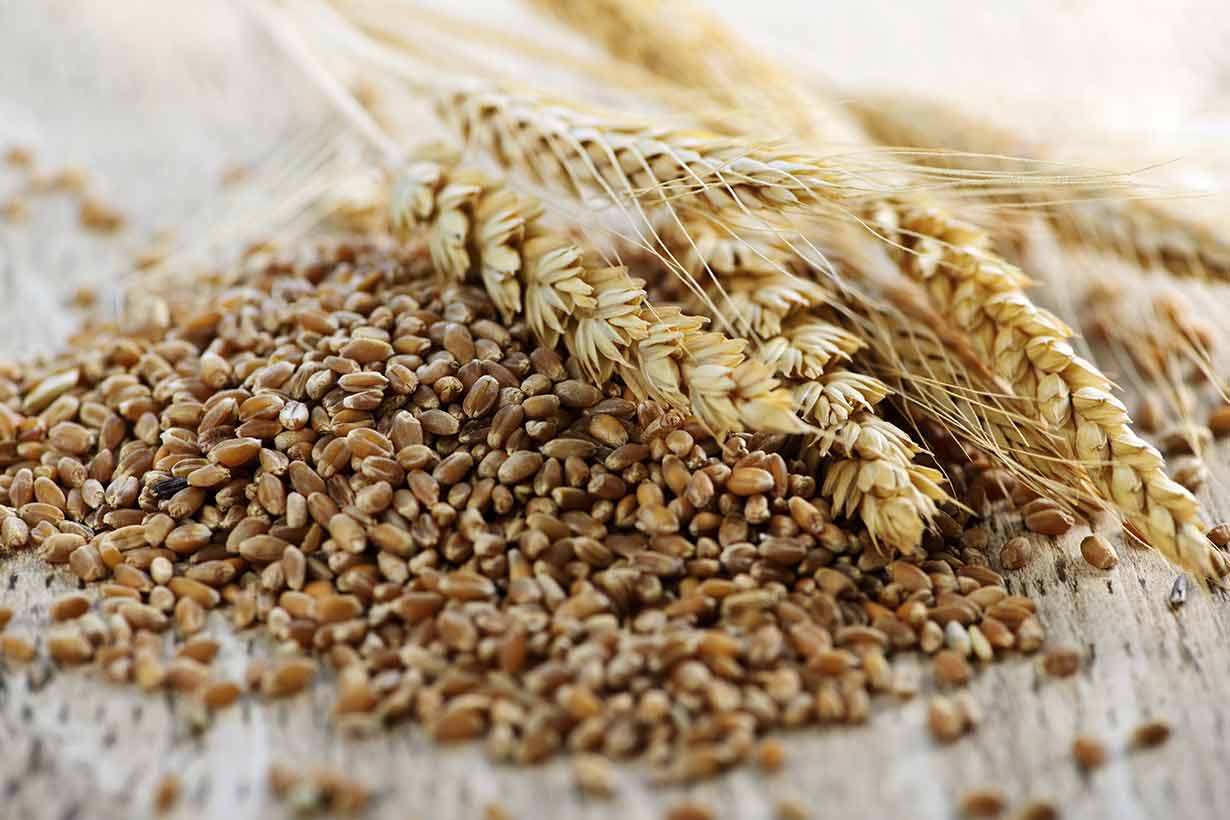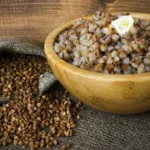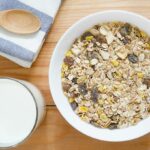Maintaining LDL cholesterol (LDL-C) levels within a healthy range can help lower the risk of cardiovascular disease.
There are several foods that are frequently mentioned for their ability to lower LDL-C, and oatmeal is one of the most prominent.
In this article, we’ll examine why oatmeal is believed to help lower LDL-C and review what the evidence from human studies actually shows.
Important Note: The content in this article is for informational and educational purposes only. It should not replace medical advice from your healthcare provider.
Table of contents
Why Oatmeal May Lower Cholesterol

The reason why oatmeal is often cited as a cholesterol-lowering food lies in the components it contains.
Beta-Glucan
Beta-glucan is a type of soluble fiber that has been heavily researched for its purported ability to lower cholesterol levels.
But how does this work? Here is a quick summary of how beta-glucan can lower cholesterol levels (1, 2):
- Beta-glucan is present in the cell walls of oats, as well as several other plant foods.
- It absorbs water and forms a thick, gel-like substance.
- This gel helps to slow digestion, and it can also bind bile acids in the intestines, which are then passed out of the body in the stool.
- Bile acids are necessary for the digestion of fats; they are formed in the liver and made with cholesterol.
- Because bile acids are now in shorter supply, the liver needs to make more of them, and it does so with cholesterol pulled from the blood.
The net result is lower circulating levels of LDL cholesterol.
Other Soluble Fibers
Oats also contain other soluble fibers, such as arabinoxylans, that may have a cholesterol-lowering effect (3).
However, there is far less research on the effectiveness of arabinoxylans in humans. At present, they are presumed to have only a minor effect compared to beta-glucan.
Learn more about the nutritional content of oats
Prebiotics
Studies have indicated that oats have a prebiotic effect and stimulate the growth of beneficial gut bacteria—collectively known as gut microbiota (4, 5).
The researchers involved in these studies suggest that oat consumption may also lower LDL-C by modulating beneficial gut bacteria.
However, once again, there is a lack of research in this area. The cholesterol-lowering effect of beta-glucan is more extensively supported (6).
What Do Human Studies Show?
Several systematic reviews have investigated the impact of oatmeal and oats on lowering LDL-C.
Systematic reviews look at all the available evidence from individual studies to answer a specific question, making them generally more reliable than single studies.
Let’s now take a look at findings from major systematic reviews on oat intake and its effect on LDL cholesterol.
Anqi Li et al. (2024)
This systematic review examined results from 17 randomized controlled trials involving a total of 1,731 participants.
It found that consumption of oat-based products—including oat beta-glucan products, oat bran, and whole grain oats—significantly reduced LDL-C levels (by 0.24 mmol/L [9.3 mg/dL] on average).
- Title: Efficacy of oats in dyslipidemia: a systematic review and meta-analysis
- Date published: February 2024
- Study link: Full text
Alcides C. de Morais Junior et al. (2023)
This systematic review analyzed findings from 28 randomized controlled trials involving 1,494 participants.
The review found that both oats and beta-glucan supplements led to a moderate reduction in LDL-C levels.
- Title: The separate effects of whole oats and isolated beta-glucan on lipid profile: A systematic review and meta-analysis of randomized controlled trials
- Date published: February 2023
- Study link: Full text
Erand Llanaj et al. (2022)
This systematic review analyzed 74 randomized controlled trials involving 4,937 participants with obesity and high cholesterol levels.
It found that oat-based interventions significantly improved LDL-C (by 0.29 mmol/L [11.2 mg/dL] on average).
- Title: Effect of oat supplementation interventions on cardiovascular disease risk markers: a systematic review and meta-analysis of randomized controlled trials
- Date published: January 2022
- Study link: Full text
Malin Schoeneck and David Iggman (2021)
This systematic review analyzed findings from 108 existing systematic reviews of randomized controlled trials.
Based on a systematic analysis of the findings on oats, there was high-level evidence that oats have at least a moderate effect on lowering LDL-C.
- Title: The effects of food on LDL cholesterol levels: A systematic review of the accumulated evidence from systematic reviews and meta-analyses of randomized controlled trials
- Date published: May 2021
- Study link: Full text
Skye Marshall et al. (2020)
This systematic review looked at 25 randomized controlled trials involving replacing refined grains with whole grains. Oats were the intervention in two of these trials.
The results showed that oats had a significant impact on lowering LDL-C (by 0.43 mmol/L [16.7 mg/dL] on average).
However, the strength of evidence for this was rated as “low” due to factors such as the small number of studies on oats included.
- Title: The effect of replacing refined grains with whole grains on cardiovascular risk factors: A systematic review and meta-analysis of randomized controlled trials with GRADE clinical recommendation
- Date published: September 2020
- Study link: Full text
Qingtao Hou et al. (2015)
This systematic review examined 15 randomized controlled trials and two observational studies that investigated oat intake on health markers in patients with type 2 diabetes.
Overall, oat intake led to a significant reduction in LDL-C (by 0.29 mmol/L [11.2 mg/dL] on average).
- Title: The metabolic effects of oats intake in patients with type 2 diabetes: A systematic review and meta-analysis
- Date published: December 2015
- Study link: Full text
Summary of Systematic Review Findings
Across six systematic reviews published between 2015 and 2024, oat-based interventions consistently show the ability to lower LDL cholesterol.
The average LDL-C reductions found in these six systematic reviews ranged from 0.24–0.43 mmol/L (9–17 mg/dL).
Public Health Guidance On Oatmeal For Cholesterol Lowering
So far, we have looked at:
- The potential mechanisms by which oats can lower LDL cholesterol.
- The findings of high-quality studies on oat intake’s impact on LDL-C.
But what do public health organizations and charities focusing on heart health state on this topic? Here’s a summary of their key positions:
Key Positions of Public Health Organizations
- The American Heart Association (AHA): The AHA notes that extensive studies link oats and oatmeal to lowering LDL cholesterol (7).
- British Dietetic Association (BDA): The BDA advises that eating more high-fibre foods, such as oats, can help to lower heart disease risk (8).
- British Heart Foundation (BHF): The BHF advise that 3 grams of beta-glucan per day—which is equivalent to approximately 100 g of oats—has been shown to contribute to healthy cholesterol levels (9).
- European Food Safety Authority (EFSA): The EFSA concludes that there is a “cause and effect relationship” between oat beta-glucan and reductions in LDL-C (10).
- Health Canada: Canada’s agency for public health agrees that claims of oat fiber being beneficial for lowering cholesterol are substantiated (11).
- Heart Foundation Australia: Australia’s Heart Foundation states that “multiple studies” have demonstrated that oats can lower LDL-C and mentions 3 grams per day of beta-glucan as a target (12).
- Heart UK: The Heart UK charity advises that oatmeal and oat-based products reduce cholesterol, again mentioning 3 grams of beta-glucan per day (13).
- The Mayo Clinic: The Mayo Clinic mention oatmeal as a “top food” for lowering cholesterol, emphasizing that it’s a good source of soluble fiber (14).
- US Food and Drug Administration (FDA): The FDA has approved a claim for oat fiber reducing the risk of heart disease since 1997 (15).
In summary: Most Western public health and heart-health organizations advise oats for lowering LDL cholesterol.
Which Other Foods Can Help?
As with anything related to nutrition, it is the overall, habitual diet that matters more than including or excluding a specific food.
While research consistently shows that oatmeal and oat-based products can lower LDL cholesterol, it is the overall diet that matters most. In this context, diets high in fiber and unsaturated fats from foods like nuts and seeds are strongly associated with lower LDL-C levels. In contrast, diets containing high levels of saturated fats can lead to elevated LDL-C (16).
For more information on foods that can help lower LDL-C, please refer to this article:
15 Foods That May Lower LDL Cholesterol
Summary
As shown throughout this article, consuming oatmeal and other oat-based products has been shown by multiple large reviews to lower LDL cholesterol.
The recommended clinical dose for this effect is 3 grams of beta-glucan, which is approximately 75 grams of dried whole-grain oats (17). This is equivalent to slightly less than 1 cup of dried oats.
These scientific findings are backed by credible health organizations, who uniformly list oats as a cholesterol-lowering food.









